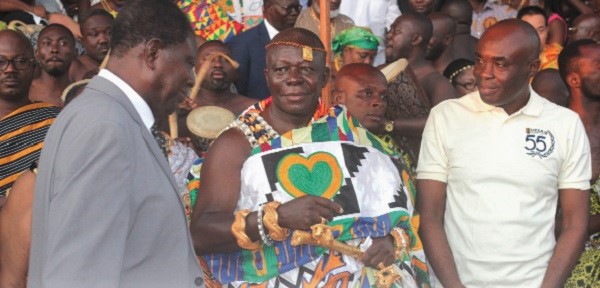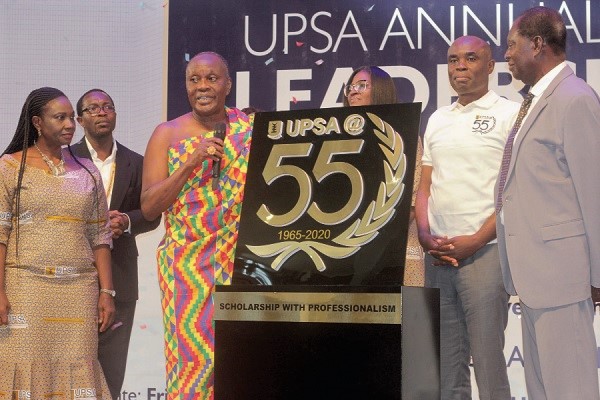
Serve, don't amass wealth: Asantehene charges politicians
The Asantehene, Otumfuo Osei Tutu II, has said that politics should not be a path to personal wealth but a path for people to serve.
According to him, men and women should not enter politics because it would make them wealthy but because it would make them worthy to serve the people.
"A drastic change in attitude to politics should be the first order of business. Politics should be the path to service and not the gravy train to personal wealth," he said.
Otumfuo Osei Tutu said this yesterday when he presented a paper titled: “Leadership: Strengthening Democratic Institutions for National Development” at the third annual lecture of the University of Professional Studies, Accra (UPSA).
The programme, which was attended by a host of dignitaries including former President J.A. Kufuor, was also used to launch the 55th anniversary celebration of the UPSA.
Other dignitaries included chiefs, queen mothers, Members of Parliament, Ministers of State and members of the diplomatic corps.
Otumfuo Osei Tutu II said there was the need for the nation to recognise that the “men who create wealth are the entrepreneurs, the farmers, the builders. It is the creators and innovators, the writers and craftsmen through whose research and knowledge national wealth is created”.
Task
The Asantehene said the task of politics was to create an environment in which the talent of the creators would flourish.
He stated that because political parties would continue to be crucial to the political process, the nation should be engaged on how the parties were organised and managed, particularly how they impacted on the machinery of government.
The Asantehene, who is an alumnus of the UPSA, said the more party machine could be constrained from intrusion into the areas of governance, the less intrusive parties become in the reward process and the greater the chance of enhancing sound government.
Electoral Commission
Otumfuo Osei Tutu II noted that peace and order were the preconditions for national development and that the survival of the state as a democracy depended upon its ability to conduct free and fair elections.
He said it was the country’s ability to conduct such elections peacefully and in the process ensure smooth transfer of power that had given the 4th Republic the universal respect within the international community.
“Responsibility for this credit belongs to the Electoral Commission. And yet somehow the commission has never had a free rein. That its operations have always been shrouded in controversy in my view reflects the sheer intensity of the political contests over which the Commission is called upon to preside,” he stated.
For the first time, he said, the commission had suffered the abrupt termination of its membership as a consequence of some perceived wrong-doing, adding that a new commission had been constituted but not all the political parties had as yet embraced them.
“I can only hope that a prolonged conflict may be avoided. We may find a lot to disagree within our hearts but reality obliges us to appreciate that continued mistrust can only be harmful to the future of this crucial institution,” he said.
Referendum brouhaha
Adding his voice to the ongoing debate on the December 17 referendum on whether or not political parties should be allowed to sponsor candidates to local level elections, the Asantehene called for cool heads to prevail.
"Because this is a matter of such momentous importance, I hope all concerned will step back and take the heat out, so we can see the light in the discourse," he said.
Nonetheless, the Asantehene expressed concern about the neglect of chiefs in the ongoing reforms at the local government level.
He said had chiefs been consulted, some chiefs would not have declared that the proposal to elect Metropolitan, Municipal and District Chief Executives (MMDCEs) and political party participation in the same process were incompatible.
“Local government in the modern era is only traditional government in Western attire. How is it possible then that the central government representing the modern state and nananom [chiefs] representing the traditional state could find no space for engagement for the consideration of a major reform on local government and to agree a common position before such crucial reforms were rolled out? .

Nana Otuo Siriboe II unveiling the 55th anniversary logo. With him are Prof. Abednego Okoe Feehi Amartey (2nd right) and Dr Kofi Ohene-Konadu, the Chairman of the UPSA Governing Council.
Laudable platform
The Vice-Chancellor of UPSA, Prof. Abednego Okoe Feehi Amartey, said as a professional institution, one of the finest gifts it could give the nation was to provide a platform such as the lecture on leadership and how it could be used to push a progressive and prosperous national agenda for all.
He praised Otumfuo Osei Tutu II for his tremendous role in national development.
The Vice Chancellor said Otumfuo’s matchless visionary leadership abilities were evident in the many initiatives he had undertaken.
The Chairman of the UPSA Governing Council, Dr Kofi Ohene-Konadu, said the topic for the lecture could not have come at a better time in the country’s democratic dispensation.
The Chairman of the Council of State, Nana Otuo Siriboe II, launched the 55th anniversary celebration of the university on behalf of the Asantehene.
